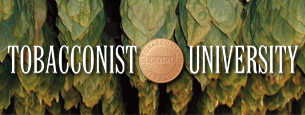What is a final exam? At the very least, it is a comprehensive wrap-up at the end of a course, designed to test your knowledge and retention - not just the last chapter or a small section, like a quiz. A final exam must cover and test the most important points of the curriculum, ensuring the graduate's knowledge is thorough and truly merits final certification. It must be specific, comprehensive and thoughtfully crafted to ensure credibility in both the education and educated.
Even when all of these requirements for a final exam are met, an important question remains: how many questions can a student get wrong and still pass? What constitutes a passing grade even when the student gets things wrong? Tobacconist University (TU) has always maintained a 90% standard for all exams, but even that high bar leaves room for improvement and imperfection.
While we now count our certifications in the thousands, TU administered its first 400+ paper exams in face-to-face settings, where every question was discussed, challenged, and refined in real time. We gathered direct feedback on the language of each question, observing how students interpreted specific words, phrasing and emphasis.
This process allowed us to see how meaning was perceived, misunderstood, or clarified. We learned how to structure language more precisely, which words required emphasis, and how subtle wording changes affected comprehension. That feedback enabled us to re-engineer and carefully craft our exams to serve the broadest possible spectrum of students and English speakers - no small task in a curriculum that necessarily includes many Spanish terms.
That same level of care also applies to the answer choices themselves - both correct and incorrect - for every question on the final exam. The incorrect answers are just as important as the correct ones, believe it or not! You don't want to trick people nor do you want to make things too easy. Typically, a well-designed multiple-choice question includes one clearly implausible "throwaway" option to help orient the test -taker. The real challenge lies in crafting the remaining incorrect answers so they are plausible, educational and constructive - often referencing material the student already knows, guiding them toward the correct answer, or reinforcing knowledge that may apply elsewhere in the exam.
It is a complicated, intricate, and imperfect process. And in many ways, a little artistic as well. We go through all of this to ensure that graduates are given a fair opportunity to demonstrate mastery of the fundamentals and facts required to earn their certification. While no exam can be perfect, the effort behind it must be extraordinary to ensure the certificate itself carries genuine merit and credibility.
Rest assured, there is no equal to the time and effort we have invested in our curriculum and final exams. The Tobacconist University Certification is unparalleled in both quality and content. For those who are serious about education and professionalism, there is no other option.
FUN FACTS
- 50% of TU students pass their final exam on the first attempt.- 90% pass by the second attempt.
- The remaining 10% receive additional, personalized support, which may include a final exam review curriculum or the opportunity to take the test with a Certified Tobacconist online and available to help.
- TU Final Exams have been 100% online since 2018.
- Each Final Exam Question Database contains 20% more questions than appear on any individual exam, allowing for rotation so that no two exams are exactly alike.
- There are certain fundamental questions which must be answered correctly from each of our Colleges, FAQs, and Glossary entries, and they must be distributed proportionally and aligned with our educational objectives. For example, the Certified Retail Tobacconist (CRT) degree includes approximately 15% of its final exam questions on non-cigar tobaccos and pipes*, while the Certified Cigar Sommelier Tobacconist (CCST) degree has none.
* Approximately 95% of the luxury tobacco industry is cigar-focused, whether measured by revenue or shelf space. As a result, many of our Certified Retail Tobacconists (CRT) tell us we include too much pipe and non-cigar related exam questions and content, while pipe specialists tell us we don't have enough. It is a struggle to balance it all, but we believe that a deep and working knowledge about pipe tobaccos broadens perspective and deepens appreciation - even for cigar specialists.
- Over the years we have seen many imitators, posers, and influencers attempt to produce so-called "educational" content. Without exception, every "masterclass", "school", or "academy" we have evaluated delivered, at best, mediocre assessments - often featuring questions that bear little or no relationship to the material being taught. This level of negligence in educational design is not merely disappointing; it is professionally indefensible and reprehensible.
- Creating comprehensive and substantive Final Exam Questions is one of the hardest challenges faced by Tobacconist University.
- Certified Consumer Tobacconist (CCT) and Certified Cigar Sommelier Tobacconist (CCST) final exams are 50 True/False and Multiple-Choice Questions - all other degrees are 100 questions.
In our thirty years of service, only a handful of students have every abandoned the certification process. The single greatest obstacle to passing the final exam is not a lack of intelligence or effort - it is not knowing what one does not know. Many people arrive with erroneous beliefs or incorrect knowledge ingrained in them, often acquired from the internet or a well-meaning but misinformed friend, and they don't reconcile or transcend that when studying.
And that is precisely why we exist: to teach proper fundamentals and transform information into professional-grade knowledge - from the first pages of our academic curriculum to the last question on the final exam.




















